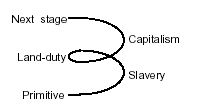|
Summary
This book is a guide to the society that will replace
Capitalism.
It finds patterns in societies' historical development and follows
the trend in these patterns to identify the society after Capitalism.
These patterns are found using a method that shows how societies develop
in an upward spiral thru a series of stages. The previous stages have
been Primitive, Slavery and Land-duty.

Primitive society ran from about 100,000 BC to 3,500
BC. Slavery dominated from about 3,500 BC to 400.
Land-duty was the main type of society from about 400 to 1600. Capitalist
societies first emerged in the 1600s.
Primitive society was classless. Class societies emerged with Slavery
to drive productivity improvements.
Underlying trends
The general trends from Primitive times to Capitalism have been:
• Increasing productivity
• Advancing technologies and production methods
Since Slavery the trend has been:
• Increasing labor freedom and laborers' incentive
Societies have alternated between:
• Decentralized societies with slow change that laid the basis
of a radically new type of socio-economic stage
• The resulting centralized societies with rapid economic growth
and social development.
Human societies' spiral development pattern is very similar to the
spiral pattern that species' life cycles follow.
This book's method is an extension of the philosophy Historical Materialism
to include the spiral development model.
Historical patterns show that Primitive and Land-duty societies are
very similar. Slavery and Capitalism are shown to be similar to each
other.
Primitive and Land-duty
Primitive and Land-duty societies had the following features:
• Decentralized production and government
• Laborers ran production
• Taxation-based economy
• Production and government followed the same regulations
Slavery and Capitalism
Slavery and Capitalist societies had the following features:
• Centralized production and government
• Owners ran production
• Taxation by government only
• Production and government followed different regulations
Following the above patterns, the next stage after Capitalism should
be similar to Primitive and Land-duty societies.
Conclusions
Amongst the book's findings are:
• Globalization will eventually result in Capitalism's collapse
• Government and the economy will decentralize, becoming more
local and more global
• Central government will have an enabling role rather than a
controlling one
• Devolved self-managing small economic units should perform
large-scale production
• Automation will remove the need for the working class's physical
labor
• Some physical production will remain for a long time and with
it remnants of the capitalist and working classes
• The class that will dominate the next society hasn't formed
yet
• This class is likely to be self-employed information product
creators
|
